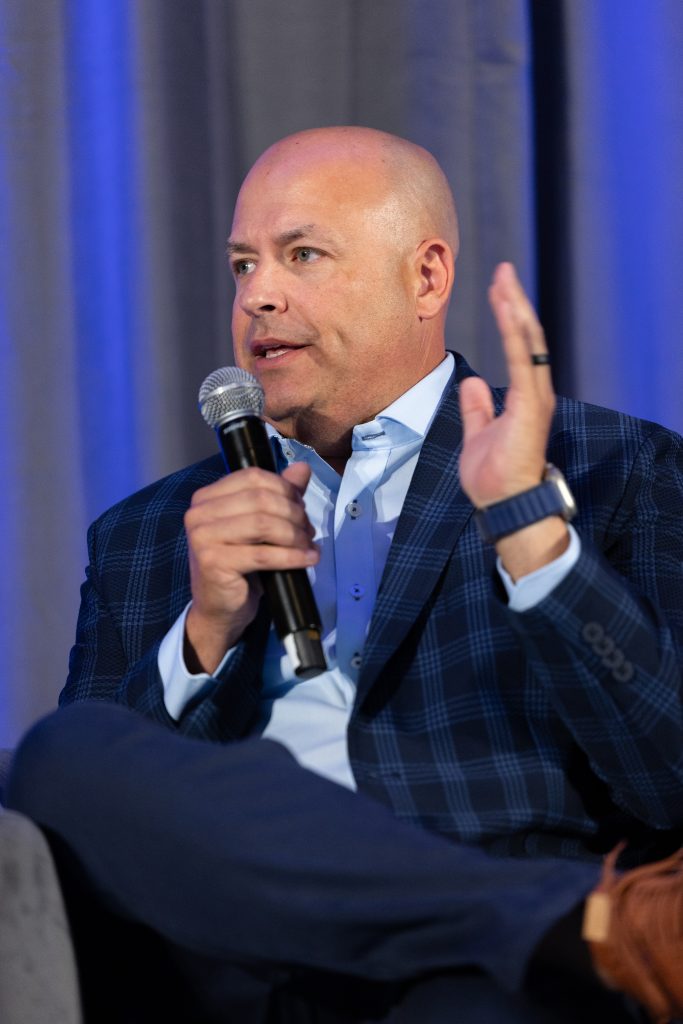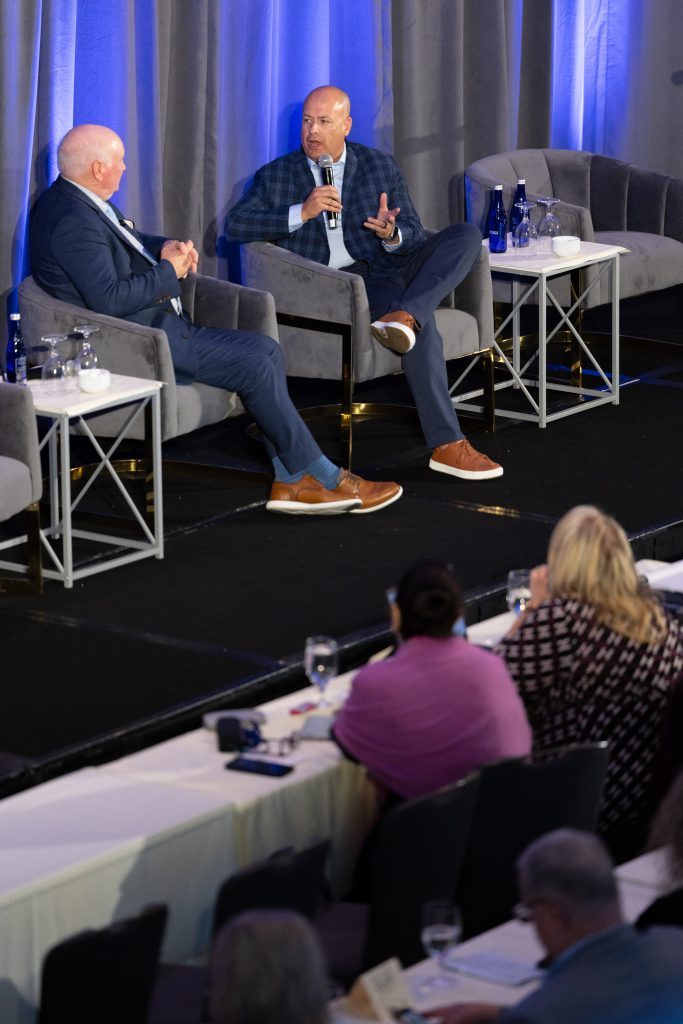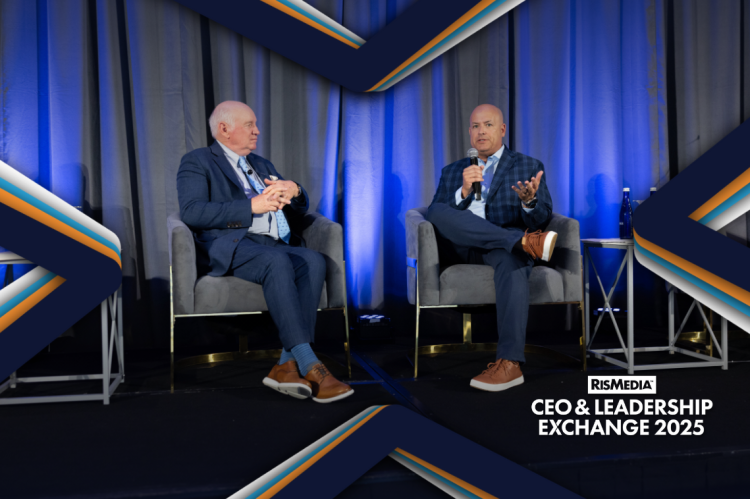Above: John Featherston, left, and Chris Kelly. Photo by AJ Canaria.
After spending 18 years at HomeServices of America in a variety of leadership roles, Chris Kelly ascended to the CEO spot in April when Gino Blefari stepped down after a storied career. During a one-on-one conversation with RISMedia Founder & CEO John Featherston during the company’s recent CEO & Leadership Exchange, Kelly addressed acquisition rumors and shared insights into what’s next for HomeServices and the industry at large.
“When you stepped into the CEO role, you walked into a quagmire where there were rumors floating around that HomeServices was being sold. How did you combat that and get through that first couple of months?” Featherston asked Kelly from the stage of the Mayflower Hotel in Washington, D.C., where the event was held September 3 – 5.
Like many of the 400-plus real estate leaders gathered in the room, Kelly explained that his focus had been on navigating a period of “triage” since the commission lawsuit verdict. Therefore, rumors about the company being sold were the least of his concerns.

Photo by AJ Canaria.
“We were one of the defendants in the original lawsuit, so we were managing through that,” said Kelly. “Then the rule changes came along. So to me, (the rumor) was a distraction, where these other things were truly triage; when you are in triage mode, you are stabilizing your organization.”
The last couple of years involved making a lot of hard decisions, but now, believes Kelly, it is time to move forward again. “Where we’re at now is, thankfully, a spot where you can move from stabilization efforts back to vision efforts.”
According to Kelly, that means getting back to focusing on HomeServices of America’s DNA—full-service real estate.
“We want to bring clarity to what we do,” said Kelly. “We’ve probably had some complexity in our organization that we didn’t need, and so we are really trying to simplify the way that we do business.”

Photo by AJ Canaria.
Achieving this goal necessitates further utilization of technology, including AI, said Kelly—provided it’s used as a means to an end. Technology, he explained, must be used to fuel your business model.
“What I have discovered, painfully at times, is that it’s really not about the bells and whistles,” he said. “It’s about ‘is this simple to use?’ I think all of us have chosen a vendor partner or a new technology, and then you’re five hours into the training and you go, ‘Oh God, this is not going to get used.’ So if you can’t honestly look yourself in the mirror and say, ‘this is simple, it’s intuitive,’ it’s probably not going to bring you (what you need).”
An ongoing topic throughout the CEO & Leadership Exchange, Kelly also discussed the future of AI in real estate, joking that in five or six years we’ll probably laugh about how much “AI” was said in 2025. Before too long, he predicted, AI will simply just be part of what we do. But at the current moment, real estate professionals are wary.
“There was a point when we were all afraid of the internet,” said Kelly. “Will consumers need us if they can just go online and look at listings? And information did not get in the way of the consumer and agent relationship. And AI—let’s call it knowledge—I don’t think knowledge does either. I use WebMD and ChatGPT to make all kinds of diagnoses on myself and family members—we still typically go to the doctor afterwards. So I don’t think knowledge is going to be something that gets between us and the consumer.”
Kelly explained that AI’s ability to reduce laborious and time-consuming processes associated with a real estate transaction—such as inspection reports, contracts and compliance—will allow real estate professionals to spend more time on relationships, which is what truly creates stickiness between agent and client, he believes.
“The consumer is not waving their arms saying, ‘I don’t want to work with agents anymore,'” said Kelly. “It’s the exact opposite. And if we use (AI) effectively, I don’t think that stickiness evaporates in any manner.”
Kelly also underscored the value of “stickiness,” or connectivity, within the professional real estate community.
“For 85% of the transactions we do, we all have to cooperate in some manner,” he said. “It’s a really special, unique business—other industries just don’t have to work together the way that we do. And that’s why I think it’s so baffling to regulators. I think it was baffling to plaintiffs’ attorneys—’why are these competitors talking to each other?’—trying to turn it into collusion and cartels and all kinds of crazy words, but it’s because it’s what’s best for the consumer. This is how we serve the consumer—by a bunch of people that kind of compete in some way, getting together in a room on how we can all be better together because that’s what’s right for the consumer.”
His belief in the strength of the consumer relationship is what keeps Kelly bullish on the future for residential broker/owners—as long as we don’t get in our own way.
“I’m bullish because the consumer/agent relationship has been super resilient despite billions of dollars being thrown at it, trying to get in between that,” said Kelly. “If we all continue to do what we do best, and we don’t destroy ourselves from within, I think we have a bright future. If anything keeps me up late at night, it’s what we would do to ourselves—where we start thinking ‘what’s best for me’ and we stop thinking ‘what’s best for the consumer,’ and we end up making it more difficult for the consumer to do a real estate transaction. That’s when they will actually start saying, ‘Is there another way to do this?'”
When Featherston asked Kelly for his predictions on industry consolidation, he agreed that the industry is likely heading further down that path. “However, I don’t think we’re going to be left with four brokerages,” he said.
As for HomeServices of America’s strategy, Kelly said the firm will be “opportunistic.”
“When we think about deploying capital and resources on acquisitions,” said Kelly, “we will look at ‘does it aid us in our mission and vision of completing that real estate service circle?’ There’s lots of different areas in the way that you service a client; we would be interested in owning businesses that provide that service that might not traditionally fall in the brokerage space.”
Stay tuned to RISMedia.com for more coverage of RISMedia’s 37th Annual CEO & Leadership Exchange.












